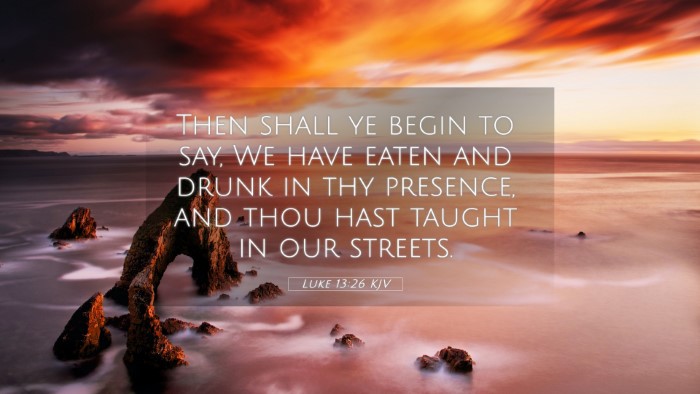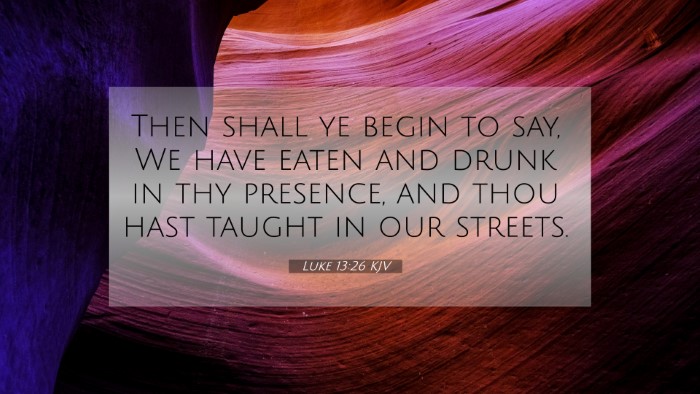Understanding Luke 13:26
Luke 13:26 states:
"Then you will begin to say, ‘We ate and drank in your presence, and you taught in our streets.’"
This verse emerges from a discourse where Jesus warns about the narrow door and the challenges of entering the kingdom of God. It reflects on the attitudes of those who presumed they had a special claim on Jesus due to their association with Him.
Contextual Significance
The broader context of this verse (Luke 13:22-30) involves the call to strive for entry through the narrow door, which signifies the arduous journey toward salvation. Jesus indicates that many might think they have an intrinsic right to God’s kingdom based on familiarity or past experiences with His teachings.
Commentary Insights
-
Matthew Henry: He suggests that the mention of "eating and drinking" signifies the common experiences people might have had with Jesus. However, such experiences do not guarantee salvation. Henry emphasizes the importance of genuine faith and repentance over mere acquaintance.
-
Albert Barnes: Barnes points out that many people, due to their proximity to Jesus and His teachings, might feel secure in their salvation. He reminds us that only those who truly follow Christ will enter the kingdom of heaven; familiarity is not a substitute for commitment.
-
Adam Clarke: Clarke elaborates on the idea that the phrase indicates a false sense of privilege among those who heard Jesus preach. He stresses the importance of not taking salvation for granted and urges deeper self-examination of one's faith and relationship with Christ.
Bible Cross-References
A more profound understanding of Luke 13:26 can be gained through related scripture. Below are notable cross-references:
- Matthew 7:21-23: This passage captures the notion of individuals claiming to know Christ while lacking true, transformative faith.
- John 6:53-57: This portion discusses the necessity of partaking in Jesus’ body and blood, underscoring a deep, spiritual communion with Christ beyond simple acknowledgment.
- Matthew 25:11-12: The parable of the ten virgins illustrates the consequences of being unprepared when the Bridegroom arrives.
- Luke 10:20: Here, Jesus reminds that the foundational joy should come from one's name being written in heaven, rather than mere experiences in ministry.
- Galatians 6:7-9: Paul’s teaching on reaping what one sows affirms the principle that true discipleship is evidenced by action and commitment.
- Romans 10:9: This verse emphasizes the heart's necessity in confessing Jesus as Lord, reinforcing that verbal acknowledgment alone is insufficient.
- James 2:19: This passage indicates that even demons believe in God’s existence, a reminder that belief without action is impotent.
- Revelation 3:15-17: The warning to the lukewarm church stresses that mere awareness of Jesus is dangerous without true belief and transformation.
- Matthew 5:20: Here, Jesus states that one’s righteousness must exceed that of the Pharisees, implying the necessity of genuine inner morality rather than external compliance alone.
- Philippians 3:18-19: Paul warns against those whose focus rests on earthly things, aligning with the necessity of genuine, spiritual life committed to Christ.
Thematic Connections
Luke 13:26 serves as a pivotal reflection on the theme of salvation and the discrepancies between perceived privilege and actual relationship with God. The scriptures evoke an inter-Biblical dialogue illustrating that true connection with Christ is characterized by faith, preparation, and an active pursuit of His teachings.
Conclusion
In studying Luke 13:26 alongside relevant cross-references, one gains insight into the themes of faith, commitment, and the nature of true discipleship. The verse serves as a solemn reminder to not rely on familiarity with Christ, but rather to foster a genuine, transformative relationship that bears spiritual fruit.





